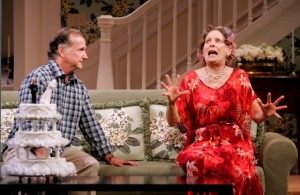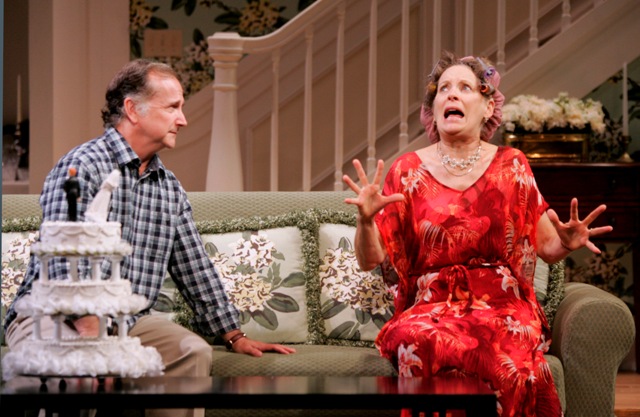
Mark Linn-Baker and Lizbeth Mackay star in ONE SLIGHT HITCH at George Street Playhouse. (Photo by Frank Wojciechowski)
If the George Street Playhouse’s set for ONE SLIGHT HITCH looks familiar, that’s because it occupied prime time television screens for close to fifteen years in the eighties and nineties. Featuring a center-stage couch, stairs to an unseen second floor, an archway offering a glimpse into the dining room, and several doors providing convenient entrance, exit, or hiding spots, it conjures memories of THE COSBY SHOW, FULL HOUSE, GROWING PAINS, and so on, and so on, ad nauseum. Set in 1981 and appropriating much of the period’s stock sitcom humor, the play uses its scenery to remind us that we are in the space of a time-gone-by, when Reagan reigned and the Walkman was the hot new gadget.
The implication seems to be that the audience ought to travel with the play back to the heyday of network sitcoms in order to embrace its dated situational humor and quaint family chaos through the dewy-eyed lens of nostalgia. That might be the only option, anyway, as the play offers little by way of irony or insightful critique of its dusty genre. Instead, it rushes headlong and gleefully into the idioms of the eighties, showing only the slightest bits of self-awareness.
It’s as though somebody unearthed a twenty-five-year-old time capsule holding the pilot to a sitcom that never got picked up, and decided to stage it at the George Street Playhouse. Oblivious to or at least unconcerned with the fact that it exists in a contemporary landscape, ONE SLIGHT HITCH is time-machine drama that asks us not to examine the mores of the past with a critical eye, but rather to forget that the past is the past in order to embrace a new version of an old form.
The play focuses on the Coleman family—Momma, Poppa, and three daughters—on the day of daughter Courtney’s (Rosie Benton) backyard wedding. Mother Delia (Lizbeth Mackay) is frantic about flower arrangements and bugbombs and all sorts of other last minute details, while father Doc (Mark Linn-Baker) is doing his best to keep Delia calm and the day running smoothly. That immediately becomes much more difficult when Courtney’s long-time ex-boyfriend Ryan (Christopher Tocco) randomly shows up at the door, and apparently unaware of the day’s significance, will not go away.
A game of misdirection ensues, defining much of the first act, in which Doc and youngest daughter P.B. (Lauren Ashley Carter) try to hide Ryan in order to keep the wedding and especially Delia from going completely off the rails. Of course Ryan is soon discovered by the rest of the family, and he and Courtney share a tenuous reunion—she had broken off their relationship, he didn’t take it well, both are bitter, the familiar story. For reasons that are strained at best, the two end their argument in a kiss meant to be casual that—say it with me—turns out to be more passionate than either had bargained for. Groom-to-be Harper (Scott Drummond) soon makes his belated entrance (unaware of the kiss), Delia becomes the last to learn about Ryan’s presence, and act one closes with the whole tangled affair awaiting comic resolution.
Of course resolution comes, as the play’s genre dictates it must, and while it may come in an unexpected form, the journey there is disappointingly bland. None of the characters break much from the convenient mold. As the patriarch who grows increasingly dimwitted as the situation gets more haywire, Linn-Baker gives us that familiar sitcom dad whose assertiveness shows the scars of thirty years in a house full of women; it is “much easier to deal with men once you realize that most of us were born to fail,” he quips. Mackay’s Delia arouses some pity for her circumstance, but as the play’s tension increases so does her shrillness, a quality of the play not aided by Delia’s verbosity.
Eldest sister Melanie (Clea Alsip) is a wise-cracking, sexually aggressive iconoclast, while the two men in the house fall neatly into odd-couple categories, Harper the preppy bourgeois, and Ryan the idealist philosopher manqué. Bride Courtney is fairly nondescript aside from an admirable independence streak, and baby of the family P.B. is just cute-as-a-nerdy-button as she does her best to keep tabs on her increasingly manic family. These characters are branded within a certain framework from the opening curtain, and at no point does anybody step out of line.
Most disappointing about ONE SLIGHT HITCH is that it denies us the comic mastery of its playwright, the brilliant stand-up comedian Lewis Black. Aside from the pre-show and post-intermission announcements, which seem like strained efforts to inject Black’s comic persona into this production, ONE SLIGHT HITCH bears none of its author’s distinctive cultural insight and critique. The opening of act two offers a few hints—aided by the characters’ frequent trips to the liquor cabinet—that maybe a WHO’S AFRAID OF VIRGINIA WOOLF element will brazenly crash this WHO’S THE BOSS party, but that is short-lived. Of course artists are free to move among various genres and styles, and I don’t mean to suggest that Black-the-Playwright needs to imitate Black-the-Comedian, but a bit of the latter’s disgust for formula, easy answers, and schmaltz could have gone a long way to break ONE SLIGHT HITCH out of its dated mold.
P.B. doubles as the play’s narrator, delivering a prologue that casts us back to 1981, and a brief epilogue filling out the family’s story. But the play never seizes the unique opportunities offered by memory, using the narrative frame simply to place itself in a particular period. ONE SLIGHT HITCH consistently makes the choices that keep it closest to its sitcom paradigm and as a result lacks the sort of intervention that could have made it a fascinating send-up of the habits of the past. Instead, the play is a love letter to the eighties sitcom, pledging commitment, fidelity, and unyielding iteration, for better or worse.
ONE SLIGHT HITCH
by Lewis Black
Directed by Joe Grifasi
October 2 – 28, 2012
George Street Playhouse
9 Livingston Avenue
New Brunswick, NJ, 08901
732-246-7717
http://www.georgestreetplayhouse.org/


